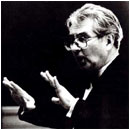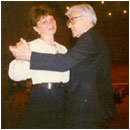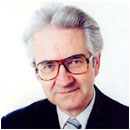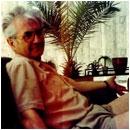 János Reményi was born in Almamellék a little village in Western Hungary on May 8, 1931. He was the eldest of the three sons of the village schoolmaster. He went to school in his native village and in Pécs the biggest town of the area. From 1951 he was the student of Zoltán Vásárhelyi at the Faculty of Choir Conducting at the Liszt Ferenc Academy of Music. Although he graduated in 1954 he never stopped learning. As a young graduate he started to work at the Bartók Béla School of Music in Szolnok, and, in 1956 he went to Miskolc where he became the leading personality of the local music life until 1985. He was active at all levels of musical education achieving remarkable results. Between 1956 and 1961 he taught solfeggio at the Erkel Ferenc music school. The music school of the Iron Works - as local people called it - was the first important station in his career. He also met his future wife Éva Soltész there who was teaching piano and whom he wed in 1959. Both of their daughters became professional musicians.
János Reményi was born in Almamellék a little village in Western Hungary on May 8, 1931. He was the eldest of the three sons of the village schoolmaster. He went to school in his native village and in Pécs the biggest town of the area. From 1951 he was the student of Zoltán Vásárhelyi at the Faculty of Choir Conducting at the Liszt Ferenc Academy of Music. Although he graduated in 1954 he never stopped learning. As a young graduate he started to work at the Bartók Béla School of Music in Szolnok, and, in 1956 he went to Miskolc where he became the leading personality of the local music life until 1985. He was active at all levels of musical education achieving remarkable results. Between 1956 and 1961 he taught solfeggio at the Erkel Ferenc music school. The music school of the Iron Works - as local people called it - was the first important station in his career. He also met his future wife Éva Soltész there who was teaching piano and whom he wed in 1959. Both of their daughters became professional musicians.
In 1961 János Reményi was appointed to the Bartók Béla High School of Music in Miskolc where he taught solfeggio and musical theory and took over the leadership of the girls' choir from Pál Kardos. In 1966 he was invited to teach choir conducting, solfeggio and musical theory at the Miskolc Teachers Training College of the Liszt Ferenc Academy of Music. In addition to teaching he conducted the string chamber orchestra and the philharmonic orchestra of the College and rehearsed with the student choir of a local high school.
 He was a person whose profession and private life did not separate as it is shown e.g. by the founding of the Chamber Choir of the Sándor Rónai Cultural Centre that was composed from a group of friends in 1961 and later lead by János Reményi. This choir was transformed into the famous Bartók Choir that was successful at several international competitions for instance Arezzo in 1974, Tolosa in 1981 and Gorizia in 1983.
He was a person whose profession and private life did not separate as it is shown e.g. by the founding of the Chamber Choir of the Sándor Rónai Cultural Centre that was composed from a group of friends in 1961 and later lead by János Reményi. This choir was transformed into the famous Bartók Choir that was successful at several international competitions for instance Arezzo in 1974, Tolosa in 1981 and Gorizia in 1983.
In addition to adults from 1970 he conducted the children's choir of the elementary school no. 6 of Miskolc that became an internationally renowned choir under his leadership and still enjoys the fruits of this heritage. The choir took part in all international choir competition in Debrecen and at the "Let the People Sing" events of the BBC. Great rewards were the victories in Tampere in 1977 and Cork in 1983. All of their stage performing became a success. Among other tasks he accepted the invitation of an amateur teachers' choir of the neighbouring city where he travelled every week.
 The children's choir performed in the Hungarian Radio several times, and Reményi's mastery and conscientious work became well known throughout the musical professionals resulting in an invitation to the position of the Artistic Leader of the Hungarian Radio Children's Choir in 1985. János Reményi had the talent and enthusiasm to meet the challenge of the new job. His work contributed a lot to the success of the choir that performed in many countries e.g. Bulgaria, Czechoslovakia, Turkey, Italy, France, Switzerland and Japan. Stockhausen requested the Hungarian Radio Children's Choir to first perform his new opera Montag aus Licht that took place in the Scala of Milan in 1988 where they took part in later performances of the opus, too.
The children's choir performed in the Hungarian Radio several times, and Reményi's mastery and conscientious work became well known throughout the musical professionals resulting in an invitation to the position of the Artistic Leader of the Hungarian Radio Children's Choir in 1985. János Reményi had the talent and enthusiasm to meet the challenge of the new job. His work contributed a lot to the success of the choir that performed in many countries e.g. Bulgaria, Czechoslovakia, Turkey, Italy, France, Switzerland and Japan. Stockhausen requested the Hungarian Radio Children's Choir to first perform his new opera Montag aus Licht that took place in the Scala of Milan in 1988 where they took part in later performances of the opus, too.
In addition to the children's choir he was appointed to teach at the teachers' training college of the Eötvös Loránd University of Budapest.
He also worked together with other musicians and critics e.g. Lajos Bárdos, József Karai, István Párkai and György Kroó. He conducted Párkai's choir several times. The City of Miskolc also followed his career and decorated him with the title of Honorary Citizen of Miskolc in 1994.
 The Ministry of Education and Culture also acknowledged his achievements when donating the NémethLászló Award to him in 1996. Due to his serious illness he was not able to take over the award personally and not much later - on July 20, 1996 - he died in the Heart Clinic of Balatonfüred.
The Ministry of Education and Culture also acknowledged his achievements when donating the NémethLászló Award to him in 1996. Due to his serious illness he was not able to take over the award personally and not much later - on July 20, 1996 - he died in the Heart Clinic of Balatonfüred.